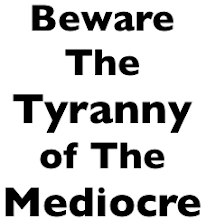 Submariner said ...
Submariner said ... I won't pretend to know the political economy of Haiti but I do know something of world history and ever-changing hierarchies and international relations. Until very recently China was subjugated by Japanese, European, and American powers. The Chinese people were considered innately inferior and valued only as menial laborers and their leadership was absolutely corrupt and inept.
I won't pretend to know the political economy of Haiti but I do know something of world history and ever-changing hierarchies and international relations. Until very recently China was subjugated by Japanese, European, and American powers. The Chinese people were considered innately inferior and valued only as menial laborers and their leadership was absolutely corrupt and inept.China was the quintessential "failed state" ruled by warlords. And I'm talking about right up until World War II. And even thereafter it was ruled by Japan. Today things are very different and the US is literally pleading for the Chinese to ratchet up their domestic consumption.
Simply because Haiti is presently in a poor condition doesn't mean that it's doomed for eternity. Vietnam in 1975 looked the same way after centuries of bouncing around between China, Japan, France, the US.
















































































































30 comments:
DV:
Is this a picture of "A Black life lost in the year 2110", around the world, because as a people we focused more on the last 200 years more than we planned for the next 100?
while every simpleton and his cousin is distracted by the chaos and the controversy - exactly who will acquire operational control of the Banque de la République d'Haïti?
how could this institution be of value at present?
... exactly who will acquire operational control of the Banque de la République d'Haïti?
LOL!! Whoooooweeee!
Craig gettin' all geoeconomic on you mugs. Talking about central banks and shit.
Haiti is about $2 billion in debt, CNu. Who wants control of the central bank of Haiti? Isn't it basically Haiti's tin cup?
Why the Blood Is On Our Hands
NEW YORK--As grim accounts of the earthquake in Haiti came in, the accounts in U.S.-controlled state media all carried the same descriptive sentence: "Haiti is the poorest country in the Western hemisphere..."
Gee, I wonder how that happened?
You'd think Haiti would be loaded. After all, it made a lot of people rich.
How did Haiti get so poor? Despite a century of American colonialism, occupation, and propping up corrupt dictators? Even though the CIA staged coups d'état against every democratically elected president they ever had?
It's an important question. An earthquake isn't just an earthquake. The same 7.0 tremor hitting San Francisco wouldn't kill nearly as many people as in Port-au-Prince.
"Looking at the pictures, essentially it looks as if (the buildings are of) breezeblock or cinderblock construction, and what you need in an earthquake zone is metal bars that connect the blocks so that they stay together when they get shaken," notes Sandy Steacey, director of the Environmental Science Research Institute at the University of Ulster in Northern Ireland. "In a wealthy country with good seismic building codes that are enforced, you would have some damage, but not very much."
When a pile of cinderblocks falls on you, your odds of survival are long. Even if you miraculously survive, a poor country like Haiti doesn't have the equipment, communications infrastructure or emergency service personnel to pull you out of the rubble in time. And if your neighbors get you out, there's no ambulance to take you to the hospital--or doctor to treat you once you get there.
Earthquakes are random events. How many people they kill is predetermined. In Haiti this week, don't blame tectonic plates. Ninety-nine percent of the death toll is attributable to poverty.
So the question is relevant. How'd Haiti become so poor?
continued,
The story begins in 1910, when a U.S. State Department-National City Bank of New York (now called Citibank) consortium bought the Banque National d'Haïti--Haiti's only commercial bank and its national treasury--in effect transferring Haiti's debts to the Americans. Five years later, President Woodrow Wilson ordered troops to occupy the country in order to keep tabs on "our" investment.
From 1915 to 1934, the U.S. Marines imposed harsh military occupation, murdered Haitians patriots and diverted 40 percent of Haiti's gross domestic product to U.S. bankers. Haitians were banned from government jobs. Ambitious Haitians were shunted into the puppet military, setting the stage for a half-century of U.S.-backed military dictatorship.
The U.S. kept control of Haiti's finances until 1947.
Still--why should Haitians complain? Sure, we stole 40 percent of Haiti's national wealth for 32 years. But we let them keep 60 percent.
Whiners.
Despite having been bled dry by American bankers and generals, civil disorder prevailed until 1957, when the CIA installed President-for-Life François "Papa Doc" Duvalier. Duvalier's brutal Tonton Macoutes paramilitary goon squads murdered at least 30,000 Haitians and drove educated people to flee into exile. But think of the cup as half-full: fewer people in the population means fewer people competing for the same jobs!
Upon Papa Doc's death in 1971, the torch passed to his even more dissolute 19-year-old son, Jean-Claude "Baby Doc" Duvalier. The U.S., cool to Papa Doc in his later years, quickly warmed back up to his kleptomaniacal playboy heir. As the U.S. poured in arms and trained his army as a supposed anti-communist bulwark against Castro's Cuba, Baby Doc stole an estimated $300 to $800 million from the national treasury, according to Transparency International. The money was placed in personal accounts in Switzerland and elsewhere.
Under U.S. influence, Baby Doc virtually eliminated import tariffs for U.S. goods. Soon Haiti was awash predatory agricultural imports dumped by American firms. Domestic rice farmers went bankrupt. A nation that had been agriculturally self-sustaining collapsed. Farms were abandoned. Hundreds of thousands of farmers migrated to the teeming slums of Port-au-Prince.
The Duvalier era, 29 years in all, came to an end in 1986 when President Ronald Reagan ordered U.S. forces to whisk Baby Doc to exile in France, saving him from a popular uprising.
Once again, Haitians should thank Americans. Duvalierism was "tough love." Forcing Haitians to make do without their national treasury was our nice way or encouraging them to work harder, to lift themselves up by their bootstraps. Or, in this case, flipflops.
Anyway.
The U.S. has been all about tough love ever since. We twice deposed the populist and popular democratically-elected president Jean-Bertrand Aristide. The second time, in 2004, we even gave him a free flight to the Central African Republic! (He says the CIA kidnapped him, but whatever.) Hey, he needed a rest. And it was kind of us to support a new government formed by former Tonton Macoutes.
Yet, despite everything we've done for Haiti, they're still a fourth-world failed state on a fault line.
And still, we haven't given up. American companies like Disney generously pay wages to their sweatshop workers of 28 cents an hour.
What more do these ingrates want?
From Democratic Underground:
In 1825 Haiti was forced to borrow 24 million francs from private French banks to begin paying off the crippling indemnity debt (from their revolution). Haiti only acknowledged this debt in exchange for French recognition of her independence, a principle that would continue to characterize Haiti's international relationships.
These indemnity payments caused continual financial emergencies and political upheavals...
Nevertheless, Haiti always made the indemnity payments - and, following those, the bank loan payments - on time. The 1915 intervention by the Marines on behalf of U.S. financial interests changed all of that, however.
The prelude to the 1915 U.S. intervention began in 1910 when the National Bank of Haiti, founded in 1881 with French capital and entrusted from the start with the administration of the Haitian treasury, disappeared. It was replaced by the financial institution known as the National Bank of the Republic of Haiti.
Part of the capital of the new national bank was subscribed by the National City Bank of New York, signaling, for the first time, U.S. interest in the financial affairs of Haiti.
(Part of) The motivation for the original U.S. financial interest in Haiti was the schemes of several U.S. corporations with ties to the National City Bank to build a railroad system there. In order for these corporations - including the W.R. Grace Corp. - to protect their investments, they pressured President Woodrow Wilson and his secretary of state, William Jennings Bryan, to find ways to stabilize the Haitian economy, namely by taking a controlling interest in the Haitian custom houses, the main source of revenue for the government.
Due to the near total ignorance at the State Department and in Washington generally about Haiti, Bryan was forced to rely on...Roger L. Farnham...
Farnham was thoroughly familiar with Haitian affairs because he was vice-president of the National City Bank of New York and of the new National Bank of the Republic of Haiti and president of the National Railway of Haiti... Farnham played a cat and mouse game with the Haitian legislature and president. Alternately, he would threaten direct U.S. intervention or to withhold government funds if they did not turn over control of the Haitian custom houses to National City Bank. In defense of Haitian independence, lawmakers refused at every juncture.
Finally, in 1914, with the outbreak of World War I, Farnham was able to convince Washington that France and Germany posed direct threats to the U.S. by their presence in Haiti. Each had a small colony of business people there.
In December of 1914, Farnham arranged for the U.S. Marines to come ashore at Port Au Prince, march into the new National Bank of Haiti and steal two strongboxes containing $500,000 (3) in Haitian currency and sail to New York, where the money was placed in New York City Bank. This made the Haitian government totally dependent on Farnham for finances with which to operate...
Cntinued,
For the next 19 years, the U.S. Marine Corps wielded supreme authority throughout Haiti...Within several years, however, charges of massacres of Haitian peasants were made against the military as Haitians revolted...
In one such incident at Fort Reviere, the Marines killed 51 Haitians without sustaining any casualties themselves. Assistant Secretary of the Navy Franklin D. Roosevelt awarded Major Smedley D. Butler the Congressional Medal of Honor...(4)
Reports of U.S. military abuses against the Haitians became so widespread that NAACP official James Weldon Johnson (5) headed a delegation to investigate the charges, which they deemed to be true.
...For the entire 19-year duration of the intervention, maximum attention was given to paying off Haiti's U.S. creditors, with little to no attention given to developing the economy.
In 1922 former Marine Brigade Commander John Russell was named as High Commissioner of Haiti, a post he held until the final days of the occupation. Under Russell's influence, all political dissent was stifled and revenue from the custom houses was turned over, often months ahead of schedule, to Haiti's U.S. bond creditors, who had assumed loans originally extended to Haiti to pay off the French plantation owners' reparations.
By 1929, however...Washington decided it was time to end the military occupation. When then President Franklin D. Roosevelt visited Haiti in 1934 to announce the pullout, he was the first head of a foreign nation in Haiti's history to extend a visit.
Despite the American military pullout, U.S. financial administrators continued to dominate the Haitian economy until the final debt on the earlier loans was retired in 1947.
The US has been the controlling power in Haiti since the dawn of the 20th Century. US = financial vampire, Haiti = blood donor.
And this history, the poverty & corruption it created, is the main reason for the magnitude of the present crisis.
And this history, & other histories like it, is how the super-rich get rich enough to buy their stately homes & pretend they're superior, stately people who don't have blood on their hands.
Good stuff Sub.
Good stuff.
That white boy sounded an awfulllll lot like your boy DV.
Propaganda and all.
Maybe now that they've heard it from a white boy some of these Plantation Negros will come around.
I aint sayin' no names DMG.
Propaganda and all.
When I called you a master propagandist I used the term in the exact same way that you speak of your own superlative ability to craft "memes".
But yeah he does echo your earlier postings. And that's not to absolve Haitians of their (our?) culpability in the condition of their country or conversely put it all on America. Just to provide some context and restore their humanity.
While the US national debt is $12 trillion, it is the Haitian burden that is cited as confirmation of their profligacy and incompetence.
All of this "free humanitarian aid" is going to be collateralized through a central bank consignment of Haiti's mineral rights.
The ROI on current proven deposits of gold alone are sufficient to make this a slam dunk.
Factor in silver, iridium, and copper - and this catastrophe will pan out to be an immensely profitable bump in the road.
I feel you Sub. In fact I felt you the first time.
"While the US national debt is $12 trillion, it is the Haitian burden that is cited as confirmation of their profligacy and incompetence."
Ohhhhhh. That's about as poignant as it gets.
"Factor in silver, iridium, and copper - and this catastrophe will pan out to be an immensely profitable bump in the road." CNu
Interesting.
Elaborate C.
What has prevented the exploitation of these mineral deposits in the past?
What has prevented the exploitation of these mineral deposits in the past?
Yeah, Craig. What has prevented the exploitation of those mineral deposits in the past??
"While the US national debt is $12 trillion, it is the Haitian burden that is cited as confirmation of their profligacy and incompetence."
Well, ummmm... consider the fact that Haiti has a per-capita gross domestic product of $1,300... while the U.S. per-capita GDP is $45,800.
As I've said before in these threads... other nations be loaning Sam money because they expect Sam to pay it back. So the situations aren't comparable.
"other nations be loaning Sam money because they expect Sam to pay it back" UBM
1) Why would other nations expect that?
2) Who, exactly, is lending what to whom?
What has prevented the exploitation of these mineral deposits in the past?
lol,
Yeah, Craig. What has prevented the exploitation of those mineral deposits in the past??
DV, your hype man is a hoot
perhaps cesar andre will translate it for you, or, you can simply note the recent date and source of the assertions...,
adds heightened interest to my query about whose operational clutches Haiti's central bank will fall into...,
more comedy...,
WHEN, not if, Sam defaults - who exactly has the wherewithal to play repo man and come collect?
Massive national debt restructuring is the stuff of which world wars are made.
WW-III - prosecuted in earnest - will work very nicely to solve the metastatic population overshoot.
Laissez le bon temps roulez!!!
Owning debt is power.
Why do you think we helped our failed banking system instead of;
Paying off every American's student loans (est. $960 bn) or
Paying off every American's credit card debt (est. $950 bn)
Both options would have helped Americans but hurt the IMF, TWB and the whole banking system.
Without owing debt - the people would have gained more power than the bankers.
uncle john is truth...,
{that's the dismissal alarm bell ringing - school on this thread is hereby adjourned}
What we see in David Mills' differing judgments of Haitian and American debt is a clear example of what Charles Tilly examined in his last book Credit and Blame. Reminds me of New Orleans after Katrina.
Reminds me of New Orleans after Katrina.
Me too.
What has prevented the exploitation of these mineral deposits in the past?
Since CNu would rather be obtuse, DV, let me take a crack at this one.
Evidently, Haiti doesn't have much to exploit in the way of mineral deposits.
Here's a bit of a Library of Congress report from 20 years ago:
"Endowed with few commercially valuable natural resources, Haiti maintained only a small mining sector in the late 1980s; mining accounted for less than 1 percent of GDP, and it employed less than 1 percent of the labor force.
"The country's only bauxite mine, the Miragoâne mine in the southern peninsula, produced an average of 500,000 tons of bauxite a year in the early 1980s; however, in 1982 the declining metal content of the ore, high production costs, and the oversupplied international bauxite market forced the mine to close.
"Bauxite had at one time been the country's second leading export.
"Copper also was mined, beginning in the 1960s, but production of the ore was sporadic."
What has prevented the exploitation of these mineral deposits in the past?
Since CNu would rather be obtuse, DV, let me take a crack at this one.
Evidently, Haiti doesn't have much to exploit in the way of mineral deposits.
Here's a bit of a Library of Congress report from 20 years ago:
"Endowed with few commercially valuable natural resources, Haiti maintained only a small mining sector in the late 1980s; mining accounted for less than 1 percent of GDP, and it employed less than 1 percent of the labor force.
"The country's only bauxite mine, the Miragoâne mine in the southern peninsula, produced an average of 500,000 tons of bauxite a year in the early 1980s; however, in 1982 the declining metal content of the ore, high production costs, and the oversupplied international bauxite market forced the mine to close.
"Bauxite had at one time been the country's second leading export.
"Copper also was mined, beginning in the 1960s, but production of the ore was sporadic."
I won't pretend to know the political economy of Haiti but I do know something of world history and ever-changing hierarchies and international relations. Until very recently China was subjugated by Japanese, European, and American powers. The Chinese people were considered innately inferior and valued only as menial laborers and their leadership was absolutely corrupt and inept. China was the quintessential "failed state" ruled by warlords. And I'm talking about right up until World War II. And even thereafter it was ruled by Japan. Today things are very different and the US is literally pleading for the Chinese to ratchet up their domestic consumption.
Simply because Haiti is presently in a poor condition doesn't mean that it's doomed for eternity. Vietnam in 1975 looked the same way after centuries of bouncing around between China, Japan, France, the US.
Once the mineral riches are appropriated, the currently threadbare surface husk will be discarded once and for all....,
Pay careful attention to who acquires operational control of the Banque de la République d'Haïti and collateralizes that acquisition with Haitian mineral rights.
Once the mineral riches are appropriated, the currently threadbare surface husk will be discarded once and for all....,
Why hasn't Haiti exploited its own "mineral riches" to date?
Same reason Cuba and Brazil hadn't looked to exploit their offshore oil deposits until very recently.
"The Chinese people were considered innately inferior and valued only as menial laborers and their leadership was absolutely corrupt and inept."
Not true when you consider their overall track record. For most of their history, they were actually global leaders in advanced spirituality & technological innovation. The last few centuries were just an uncharacteristic cyclic dip. Even Hitler admitted they were previously superior to Europeans:
"I have never regarded the Chinese or Japanese as being inferior to ourselves. They belong to ancient civilizations, and I admit freely that their past history is superior to our own." - Adolf Hitler, 1945
Now, when you look at Haitian or African over the longhaul...you see that poverty & violence is the rule, not the exceptional blip.
Define "longhaul?"
Cause if we're going back to the dawn of time, Africans had a reign as a superior civilization that matched anything of any other civilization.
Post a Comment